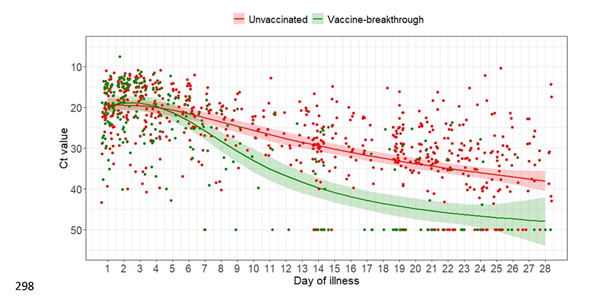Public Health England (PHE) has published their latest technical briefing documents on novel SARS-CoV-2 variants.
Prof Peter Openshaw, Professor of Experimental Medicine, Imperial College London, said:
On hospitalisation numbers:
“This doesn’t mean the vaccine is not stopping people being hospitalised, but it’s not 100%. If the vaccine didn’t work at all, we’d expect the same proportion of those who are vaccinated to be admitted. So, if 75% of the population is fully vaccinated we would expect 75% of those in hospital to have been fully vaccinated if the vaccine isn’t working. The fact only 34.9% of those in hospital have been fully vaccinated means that the vaccines are working, even against the Delta agent. It is not as good as the protection against previous variants but vaccines are still preventing serious disease and deaths.
On the data on level of virus in those infected with Delta who have been vaccinated:
“Although according to the latest studies, Delta viral loads are quite similar in the first phase of infection in those who had and hadn’t been vaccinated. This is disappointing, but the good news is that the virus disappears faster in most people who have been vaccinated. So the window for transmission may be narrower in people who have been vaccinated. See https://www.medrxiv.org/content/10.1101/2021.07.28.21261295v1 (see graph below).
“The vaccine is less effective against Delta than against some other variants, but there are even more evasive variants around in the world. We are keeping a very close eye on these variants, but for the time being you still get a lot of benefit by being double vaccinated.”

Prof Stephen Evans, Professor of Pharmacoepidemiology, London School of Hygiene & Tropical Medicine, said:
On hospitalisation numbers:
“If 100% of people were vaccinated, and the virus was still circulating there would still be a relatively small number of infections, hospitalisations and deaths because no vaccine is 100% effective. All the cases, hospitalisations and deaths would then obviously be in vaccinated people. It does not mean that the vaccines are ineffective, just that they are not 100% effective.
“With a lower than 100% effectiveness then with increasing numbers of people who are vaccinated larger numbers of people who reach hospital after being infected will have been vaccinated. The evidence we have from non-randomised studies is that vaccine effectiveness is, as expected, somewhat less against the delta variant than it is against the original variant of SARS CoV-2. The evidence we have is that this is a reduction, but not a reduction to zero, effectiveness. The vaccines still reduce the chance of being hospitalised and you assess this by a study rather than simply looking at the numbers of vaccinated people who get admitted to hospital.”
All our previous output on this subject can be seen at this weblink:
www.sciencemediacentre.org/tag/covid-19
Declared interests
Prof Stephen Evans: “No conflicts of interest. I am funded (one day per week) by LSHTM. They get funding from various companies, including Astra Zeneca and GSK but I am not funded by them, I have no involvement in obtaining funding from them and I am not an investigator on any grants obtained from them. I am the statistician to the ‘meta-Data Safety and Monitoring Board’ for CEPI. I am paid for my attendance at those meetings and will be paid expenses for travel if that occurs. I am a participant in the Oxford/Astra Zeneca trial, and on 13th January 2021 learnt I had received the active vaccine.”
None others received.